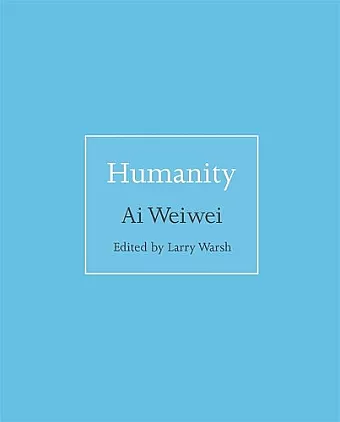Humanity
Ai Weiwei author Larry Warsh editor
Format:Hardback
Publisher:Princeton University Press
Published:20th Mar '18
Should be back in stock very soon

Writings on human life and the refugee crisis by the most important political artist of our time
Ai Weiwei (b. 1957) is widely known as an artist across media: sculpture, installation, photography, performance, and architecture. He is also one of the world's most important artist-activists and a powerful documentary filmmaker. His work and art call attention to attacks on democracy and free speech, abuses of human rights, and human displacement--often on an epic, international scale.
This collection of quotations demonstrates the range of Ai Weiwei's thinking on humanity and mass migration, issues that have occupied him for decades. Selected from articles, interviews, and conversations, Ai Weiwei's words speak to the profound urgency of the global refugee crisis, the resilience and vulnerability of the human condition, and the role of art in providing a voice for the voiceless.
Select quotations from the book:
"This problem has such a long history, a human history. We are all refugees somehow, somewhere, and at some moment."
"Allowing borders to determine your thinking is incompatible with the modern era."
"Art is about aesthetics, about morals, about our beliefs in humanity. Without that there is simply no art."
"I don't care what all people think. My work belongs to the people who have no voice."
"The prominent Chinese artist and dissident Ai Weiwei has long used his fame and social media as a megaphone for his activism. It was because of his blogging and Twitter activity criticizing the government that he was detained by the Chinese police for nearly three months and had his passport taken away in 2011. And his Instagram posts of the last few years have brought increasing international attention to the refugee crisis, as has his documentary Human Flow, released last fall. But now Mr. Ai has returned to a more traditional form of expression: Humanity, a little blue book . . . that collects excerpts from Mr. Ai’s thoughts and aphorisms."---Robin Pogrebin, New York Times
"Praise for Ai Weiwei's Weiwei-isms: "Here is a man who understands how to get messages to people. His expertise in artful dissemination is the 21st-century equivalent of Andy Warhol's brilliant populism.... [E]pigrammatic, pungent, uncompromising.""---Peter Aspden, Financial Times
"A collection of impassioned quotations from Chinese artist and activist Ai that urge the developed world to assume a more charitable response to the global refugee crisis, the largest displacement of people since WWII. . . . This is not an analysis of the refugee crisis, but rather . . . field notes from the front lines. The result is a powerful and timely account of the refugee crisis that posits no easy solutions." * Publishers Weekly *
"In his book Humanity, the Chinese artist Ai Weiwei, takes us on a meditation of sorts, from understanding through to action, via a series of quotations he has given in various magazines, podcasts, etc., around the world. . . . The quotes are presented and organized by artist and longtime collaborator Larry Warsh, who also writes the introduction, starting with the question 'What is our human obligation?' [Humanity offers a way ] to answer that question in light of current crises that are costing the lives of tens of thousands of people around the world. . . . Important reading."---Deborah Dundas, Toronto Star
"Larry Warsh has done a great job in putting this collection together. It starts with an ending: 'My conclusion is we are one humanity. If anyone is being hurt, we are all being hurt. If anyone has joy, that‘s our joy.' It closes with a call to action: 'Indifference does not liberate us, but instead cuts us off from reality.' Make some space for these aphorisms in your focuses over the coming year, spread the word."---Stewart Rayment, interLib
"
In Humanity, Ai Weiwei tells us that because no artist can be self-contained, he feels that refugees are part of him and that he is part of them. He invites us to enter into a circuit of mutuality and empathy that involves a subject, an artist and an audience with consequences that
go beyond the artistic situation.
ISBN: 9780691181523
Dimensions: unknown
Weight: unknown
168 pages